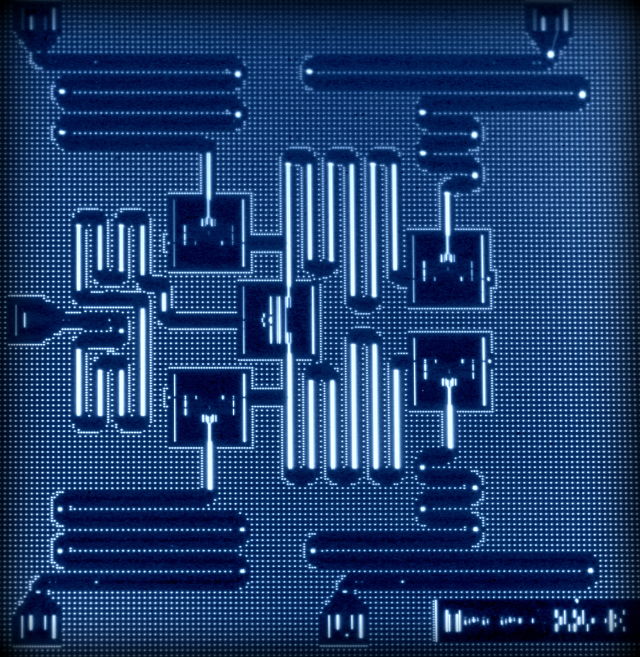6.2410 – Laboratory in Quantum Systems Engineering: Quantum Engineering Platforms#
This is the course website for the Spring 2024 offering of 6.2410 – Laboratory in Quantum Systems Engineering: Quantum Engineering Platforms
Instructors#
Dirk R. Englund
Associate Professor of Electrical Engineering
englund@mit.edu, office 36-525
P. Donald Keathley
Principal Research Scientist, Research Laboratory of Electronics
pdkeat2@mit.edu, office 36-285
Teaching Assistants#
Isaac Harris
ibwharri@mit.edu, office 36-531
Max Aalto
maxaalto@mit.edu
Hanfeng Wang
hanfengw@mit.edu, office 36-533
Collaborators#
We gratefully acknowledge assistance and contributions from QuTools in the development of lab modules and experiments, with particular input from Björn Habrich, Valentin Habrich, and Nico Klein.
Catalog Information#
Description: Design and implementation of quantum information science and engineering, with a focus on technology areas (T1) quantum computing, (T2) quantum communications, and (T3) quantum sensing and quantum metrology. This laboratory-centric course focuses on the following quantum engineering platforms: (E1) quantum optics with an emphasis on enhanced sensing and communication; (E2) quantum simulation and computational tools; and (E3) and solid state spin systems with a focus on quantum sensing and magnetometry.
Prereqs: 6.2400, 6.6400, 18.435, or (8.04 and 8.05)
Units: 1-5-6
Laboratory Location: 38-633
Laboratory Meeting Times:
Section 01: MW 10-12
Section 02: TR 1-3
Office hours: TBA
Overview#
This course covers an introduction to experimental methods and systems engineering in quantum information science and engineering, with a focus on technology areas of (T1) quantum computing, (T2) quantum communications, and (T3) quantum sensing and metrology. These technology areas will be explored through both experimental and simulation platforms that are introduced in prepared laboratory exercises. The prepared laboratory exercises will be broken into three types of platforms: (E1) quantum optics, with a focus on topics such as entanglement, single-photon interference, quantum key distribution, and quantum-enhanced sensing; (E2) quantum simulation and computational tools, such as QuTip and IBM Qiskit; and (E3) solid-state spin systems with a focus on quantum sensing and magnetometry.
The first half of the semester is dedicated to basic training through prepared exercises. The first week will include an introduction to the laboratory and equipment. The next six weeks will be for the development of core skills through prepared laboratory exercises. These prepared laboratory exercises are divided into four modules, with each module lasting two weeks in total (4 2-hour lab sessions). The modules will be completed in teams of 3-4 students. Each team will complete three of the four modules during the first half of the course.
Each module will include: (1) lecture notes and materials as well as pre-lab questions that are to be submitted for grading; (2) implementation of prepared exercises with individual lab notebook check-ins; and (3) the writing of summary reports. In these summary reports students are expected to address particular questions and topics noted within the module instructions.
The second half of the semester is dedicated to open-ended final project activities (6 weeks). Final project activities are broken into three phases: (1) proposal; (2) project work; (3) final report. The proposal phase occurs over 2 weeks, and the final project work and report take up the remaining 4 weeks. The final project must be within the broader area of quantum engineering and quantum technologies, and should build upon the material, skills, and technologies covered by the prepared lab activities from the first half of the course. The educational purpose of the final project is to build technical expertise and broader contextual understanding from project conceptualization through to completion.
CI-M#
This course is a CI-M course, and the communication-intensive components center around: (1) lab summaries; (2) proposal pitches (oral and written); as well as (3) final reports (again both oral and written). Feedback will be provided by instructors throughout this process, with the opportunity for revision in the proposal phase. The communication-intensive component is integral to the class. Not only does it provide skill development in communication activities relevant to real-world project development and communication, but it also serves as the primary means to determine the quality of the final project and level of technical understanding.
Course Materials#
The course provides an online text (this website) lecture notes and other resources. Suggested references and content for further reading and viewing are provided where relevant.
Grading#
The grading will be based on:
3 Written Summaries (~2-3 pages each) — 15%
Lab notebooks – 10%
Lab Performance and Attendance – 10%
Pre-lab questions – 10%
Open-ended design lab proposal and presentation – 15%
Open-ended design laboratory (final report and presentation) – 40%
Open-Ended Design Project#
Students will select open-ended design projects following on core material covered in the technology areas (T) and experimental platforms (E). Students will be able to pursue projects that focus in varying degrees on design, construction, and testing of software or hardware, emphasizing different concentrations from 6.1, 6.2, and 6.3. The projects will include a proposal document and presentation as well as a final research report and presentation. The two-week proposal period is essential for the development of a successful project plan. These plans will incorporate feedback from course instructors and TAs, and will have to be approved by instructors and TAs. Project effort begins as soon as a proposal plan is approved.
Schedule#
Week |
Topics |
|---|---|
1 |
Introduction to “quantum engineering” laboratory. Overview of course & platforms. |
2-3 |
Round 1 Labs in groups of 3-4; lab report |
4-5 |
Round 2 Labs in groups of 3-4; lab report |
6-7 |
Round 3 Labs in groups of 3-4; lab report |
8-9 |
Open-ended design project proposal document + pitch presentation |
10-14 |
Open-ended design projects leading to final report and presentation |
Course Lab Table#
Course Website Table of Contents#
Introductory Material
T3E1 -- Interference, Entanglement, Quantum-Enhanced Sensing
T2E1 -- Quantum Information and Quantum Key Distribution
T3E3 -- Solid State Spins
T1:3E2 -- Quantum Computation Lab (COMING SOON)
Final Projects
